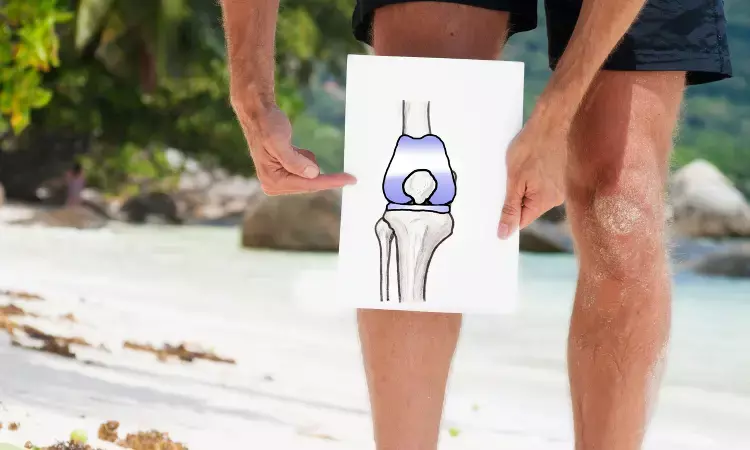- Home
- Medical news & Guidelines
- Anesthesiology
- Cardiology and CTVS
- Critical Care
- Dentistry
- Dermatology
- Diabetes and Endocrinology
- ENT
- Gastroenterology
- Medicine
- Nephrology
- Neurology
- Obstretics-Gynaecology
- Oncology
- Ophthalmology
- Orthopaedics
- Pediatrics-Neonatology
- Psychiatry
- Pulmonology
- Radiology
- Surgery
- Urology
- Laboratory Medicine
- Diet
- Nursing
- Paramedical
- Physiotherapy
- Health news
- Fact Check
- Bone Health Fact Check
- Brain Health Fact Check
- Cancer Related Fact Check
- Child Care Fact Check
- Dental and oral health fact check
- Diabetes and metabolic health fact check
- Diet and Nutrition Fact Check
- Eye and ENT Care Fact Check
- Fitness fact check
- Gut health fact check
- Heart health fact check
- Kidney health fact check
- Medical education fact check
- Men's health fact check
- Respiratory fact check
- Skin and hair care fact check
- Vaccine and Immunization fact check
- Women's health fact check
- AYUSH
- State News
- Andaman and Nicobar Islands
- Andhra Pradesh
- Arunachal Pradesh
- Assam
- Bihar
- Chandigarh
- Chattisgarh
- Dadra and Nagar Haveli
- Daman and Diu
- Delhi
- Goa
- Gujarat
- Haryana
- Himachal Pradesh
- Jammu & Kashmir
- Jharkhand
- Karnataka
- Kerala
- Ladakh
- Lakshadweep
- Madhya Pradesh
- Maharashtra
- Manipur
- Meghalaya
- Mizoram
- Nagaland
- Odisha
- Puducherry
- Punjab
- Rajasthan
- Sikkim
- Tamil Nadu
- Telangana
- Tripura
- Uttar Pradesh
- Uttrakhand
- West Bengal
- Medical Education
- Industry
Duloxetine Added to Multimodal Pain Management Reduced Opioid Use After TKR

A study by researchers at Hospital for Special Surgery (HSS) found that the antidepressant duloxetine reduced the use of opioid medication when added to a multimodal pain management regimen after knee replacement surgery. The study appeared in The Journal of Arthroplasty.
Duloxetine, sold under the brand name Cymbalta, is prescribed to treat major depressive disorder, anxiety, musculoskeletal pain, fibromyalgia, and neuropathic pain. The HSS investigators set out to determine if duloxetine would also reduce opioid consumption or pain after a total knee replacement.
"In addition to improving patient comfort, improved pain management after knee replacement is also linked to faster rehabilitation, reduced complications, improved patient satisfaction, and less use of potent narcotics," explains Geoffrey Westrich, MD, a Professor of Clinical Orthopedic Surgery at HSS and senior study author. "A multimodal pain management regimen often includes opioids, but they are associated with side effects and the potential for physical dependence and tolerance. Given the link between the opioid epidemic and opioid over-prescription, it is desirable to find methods to reduce postoperative opioid use," adds Dr. Westrich, who specializes in knee and hip surgery.
A total of 160 patients at HSS were randomized to receive 60 mg duloxetine in pill form or a placebo daily, starting on the day of surgery and continuing for 14 days postoperatively. In the triple-blinded study, neither the patients, doctors, nor research assistants knew who was getting duloxetine versus placebo. All patients received multimodal analgesia that included spinal epidural anesthesia and peripheral nerve blocks during surgery, and acetaminophen, nonsteroidal anti-inflammatory drugs, and oral opioids after surgery as needed.
Outcome data on pain was gleaned from the numeric rating scale (NRS), in which patients rate their pain on a scale of 1 to 10. Patients rated their pain on postoperative days 1, 2, and 14. Researchers also recorded cumulative opioid consumption from the day of surgery through postoperative day 14.
The study found that patients receiving duloxetine needed less opioid medication to reach similar pain scores on the NRS compared to placebo. A 29% reduction in opioid use, corresponding to 17 fewer pills of oxycodone, 5 mg, per patient was recorded without increasing pain scores.
Those receiving duloxetine reported higher satisfaction with pain management and found that pain was less likely to interfere with mood, walking, work, relations with other people, sleep, and enjoyment of life. Major side effects were not noted. More adverse events were reported among patients in the placebo group than those in the duloxetine group.
"Our research found that duloxetine can be used to reduce opioid usage after total knee replacement in selected patients who can be appropriately monitored for any potential side effects of the medication," Dr. Westrich noted. "Additional studies are needed to define the optimal duration of treatment, to assess for rare side effects, and to examine the applicability of postoperative duloxetine for other surgical procedures."
Reference:
Effect of Duloxetine on Opioid Use and Pain After Total Knee Arthroplasty: A Triple-Blinded Randomized Controlled Trial Jacques T. YaDeau, MD, PhD David J. Mayman, MD Kethy M. Jules-Elysee, MD Chad M. Brummett, MD Haoyan Zhong, MPA Geoffrey Westrich, MD Published:February 18, 2022 DOI: https://doi.org/10.1016/j.arth.2022.02.022
Dr Kamal Kant Kohli-MBBS, DTCD- a chest specialist with more than 30 years of practice and a flair for writing clinical articles, Dr Kamal Kant Kohli joined Medical Dialogues as a Chief Editor of Medical News. Besides writing articles, as an editor, he proofreads and verifies all the medical content published on Medical Dialogues including those coming from journals, studies,medical conferences,guidelines etc. Email: drkohli@medicaldialogues.in. Contact no. 011-43720751


